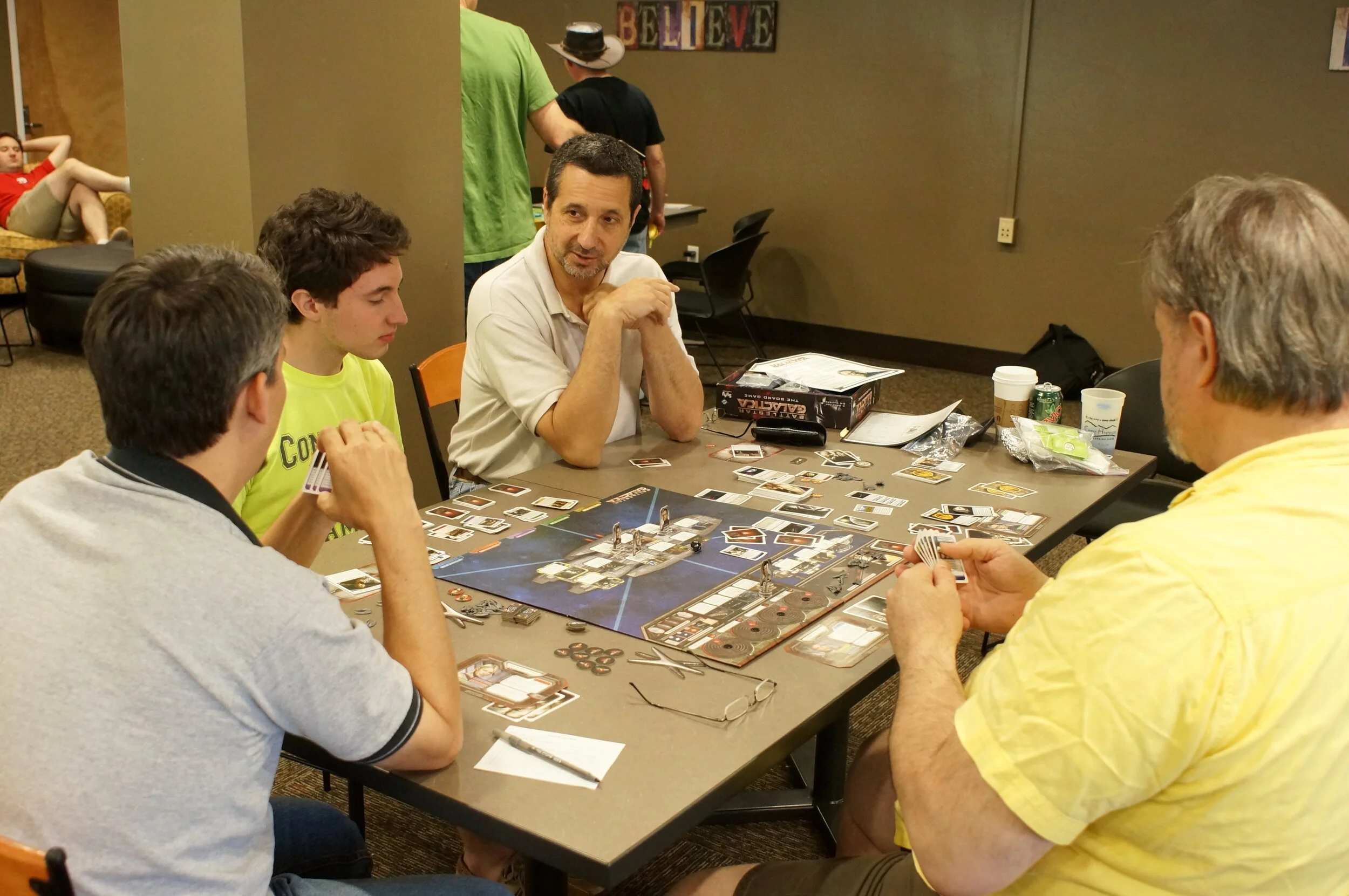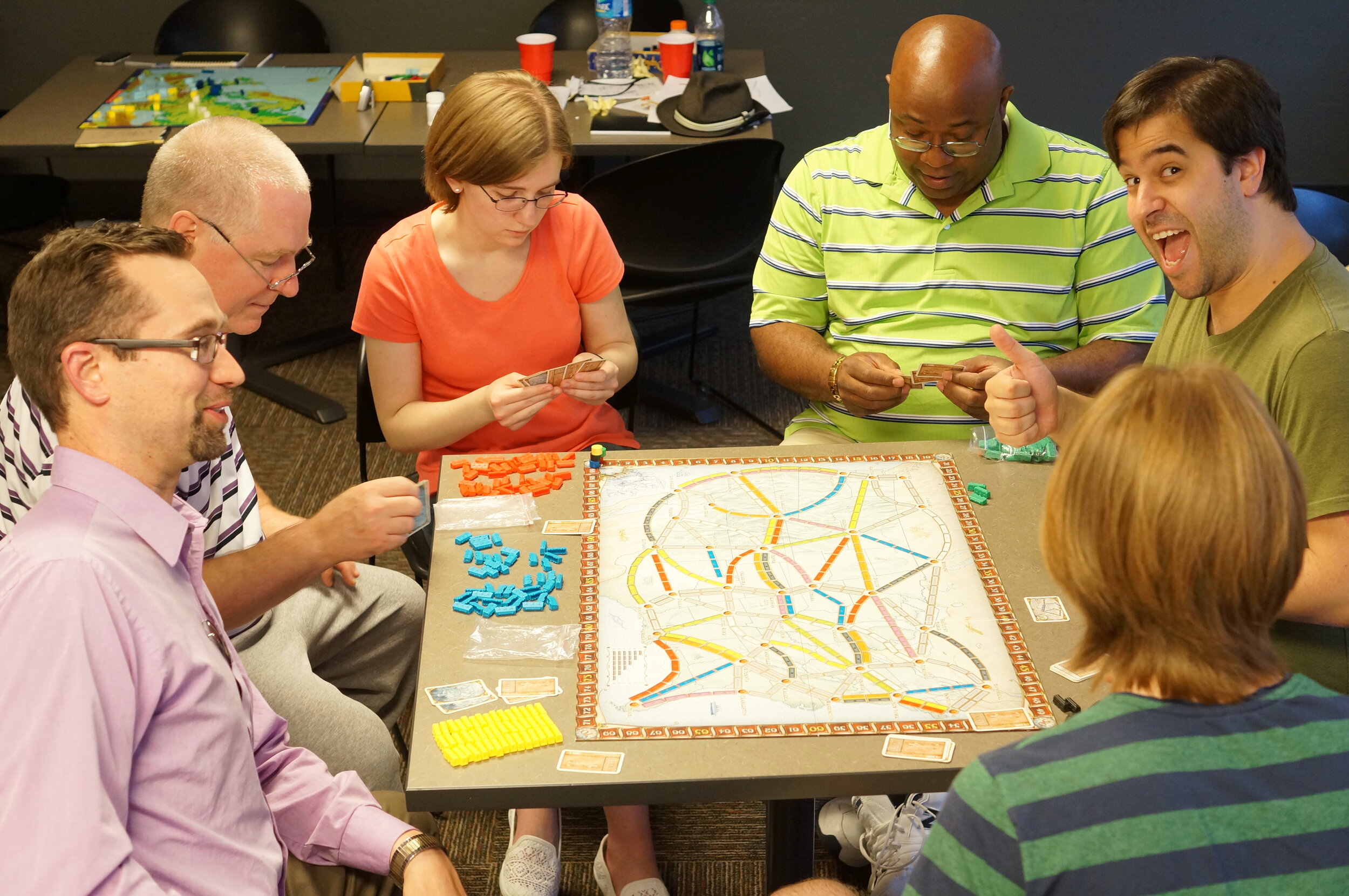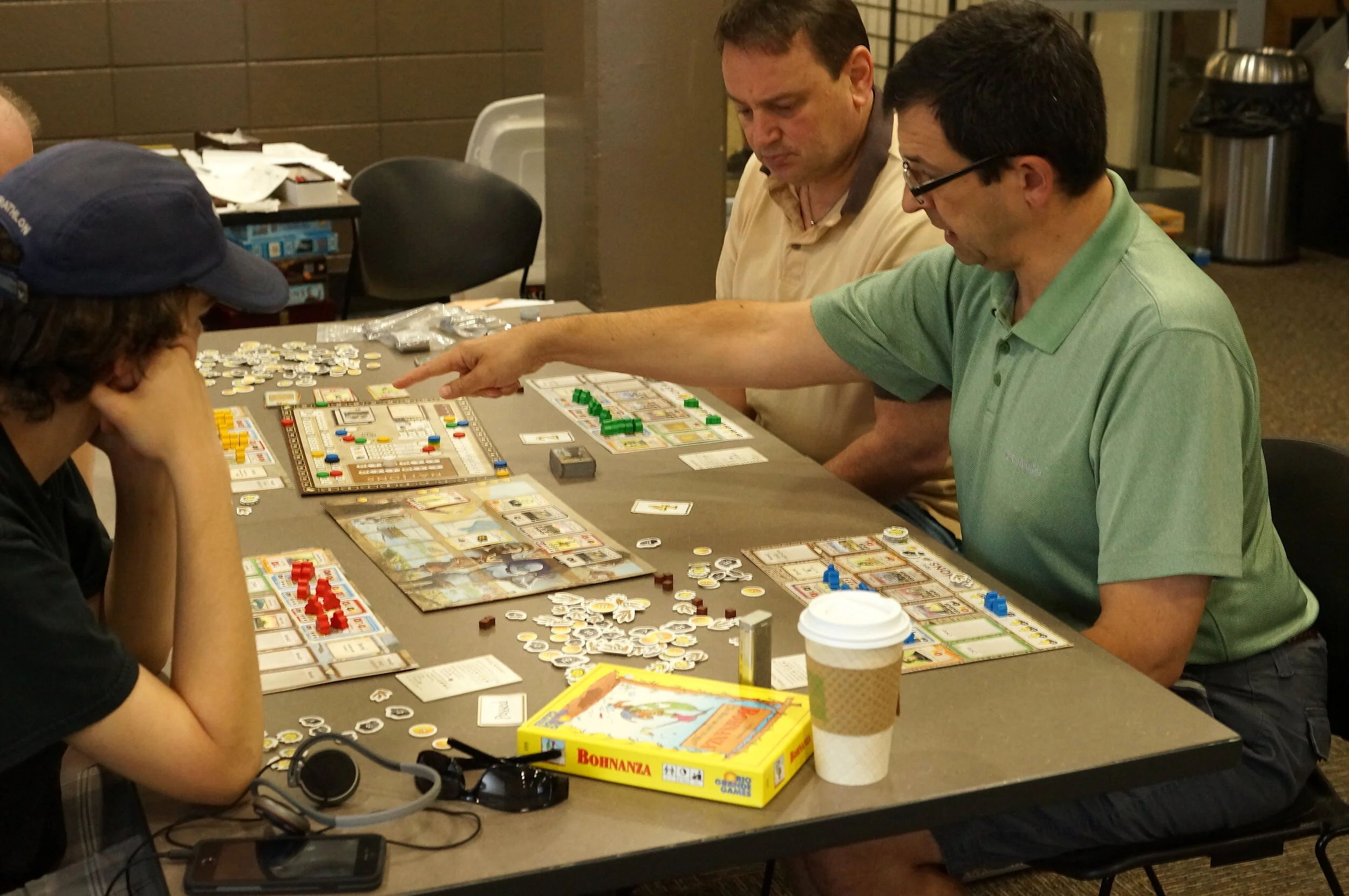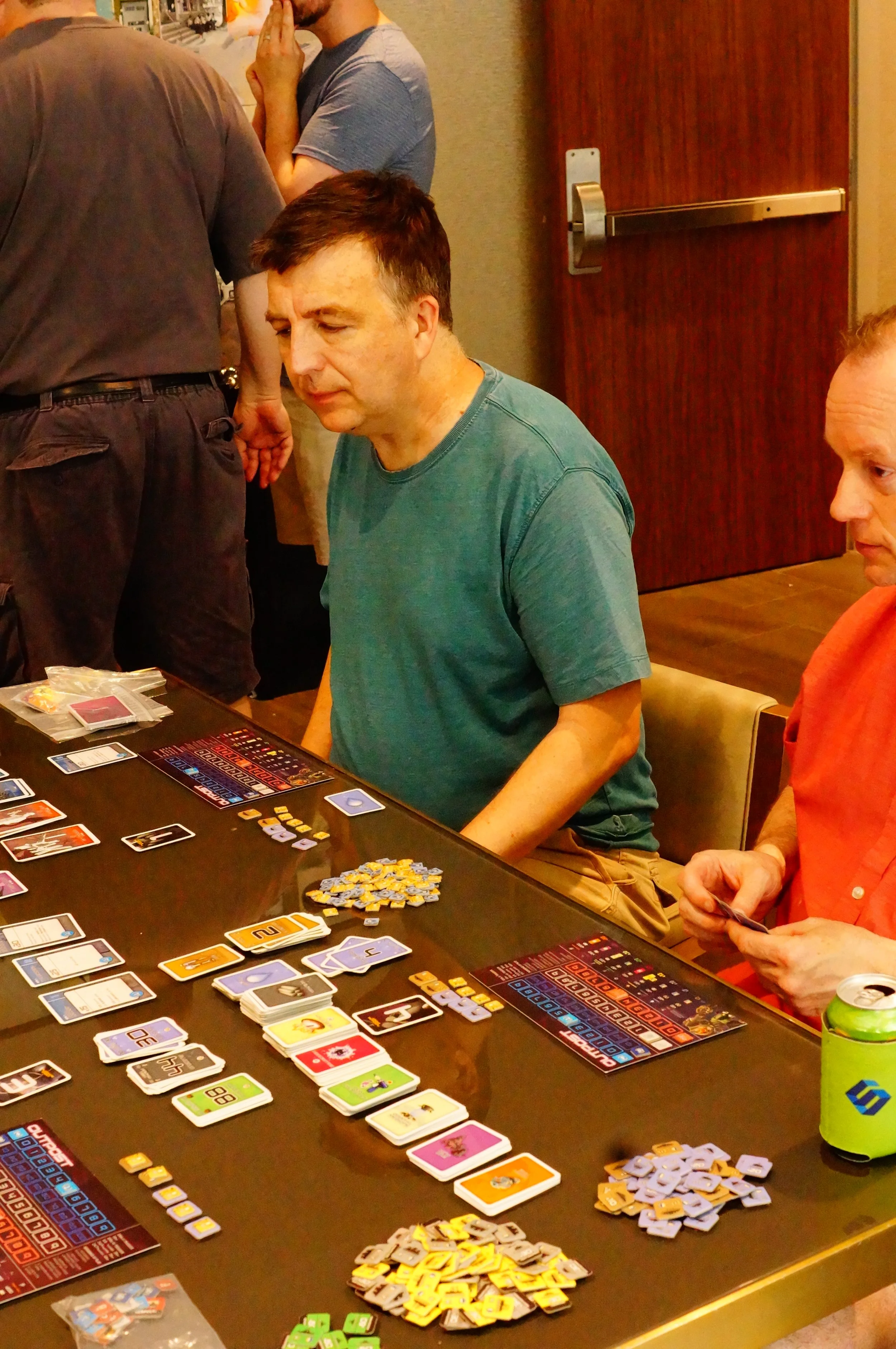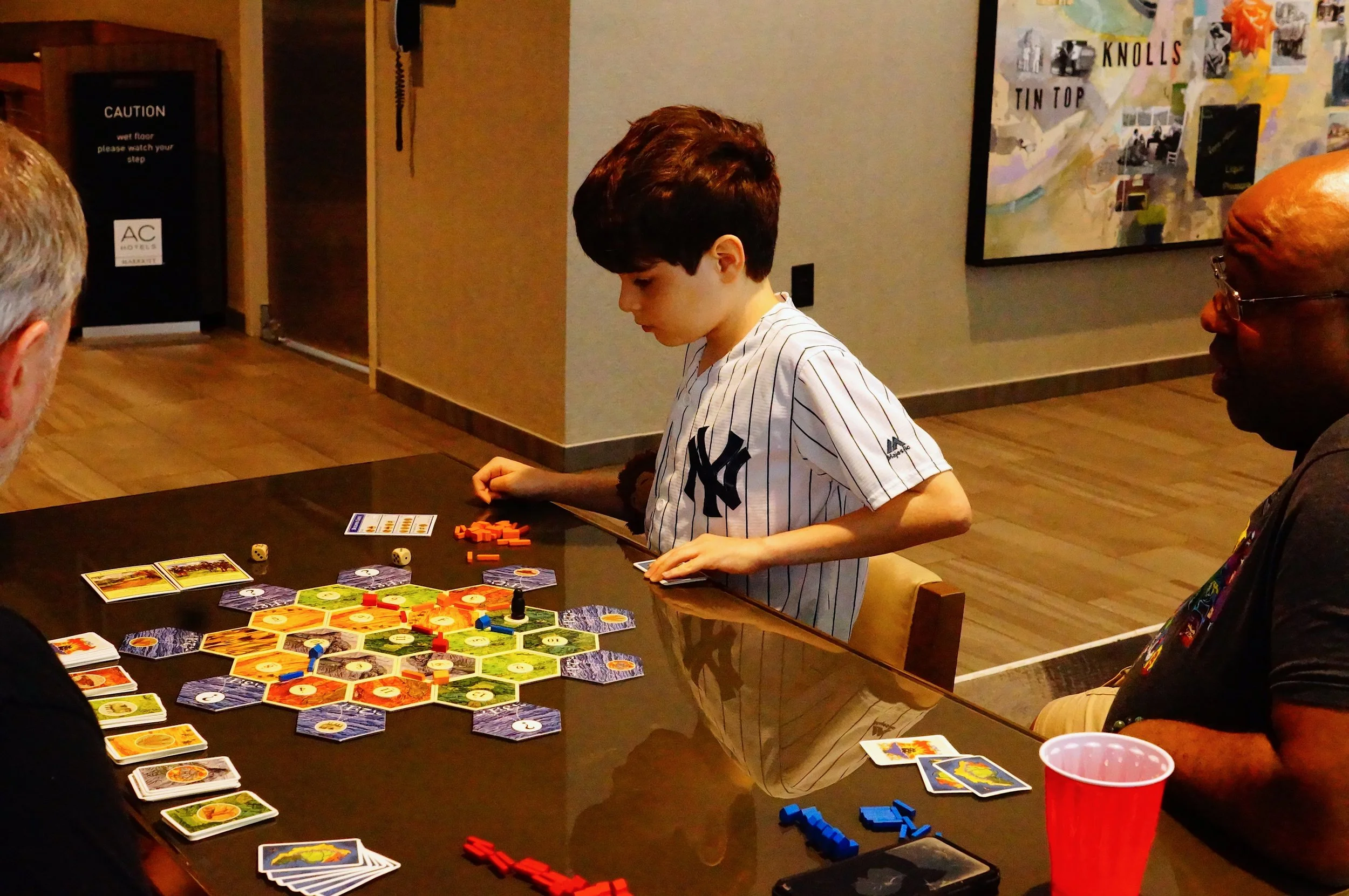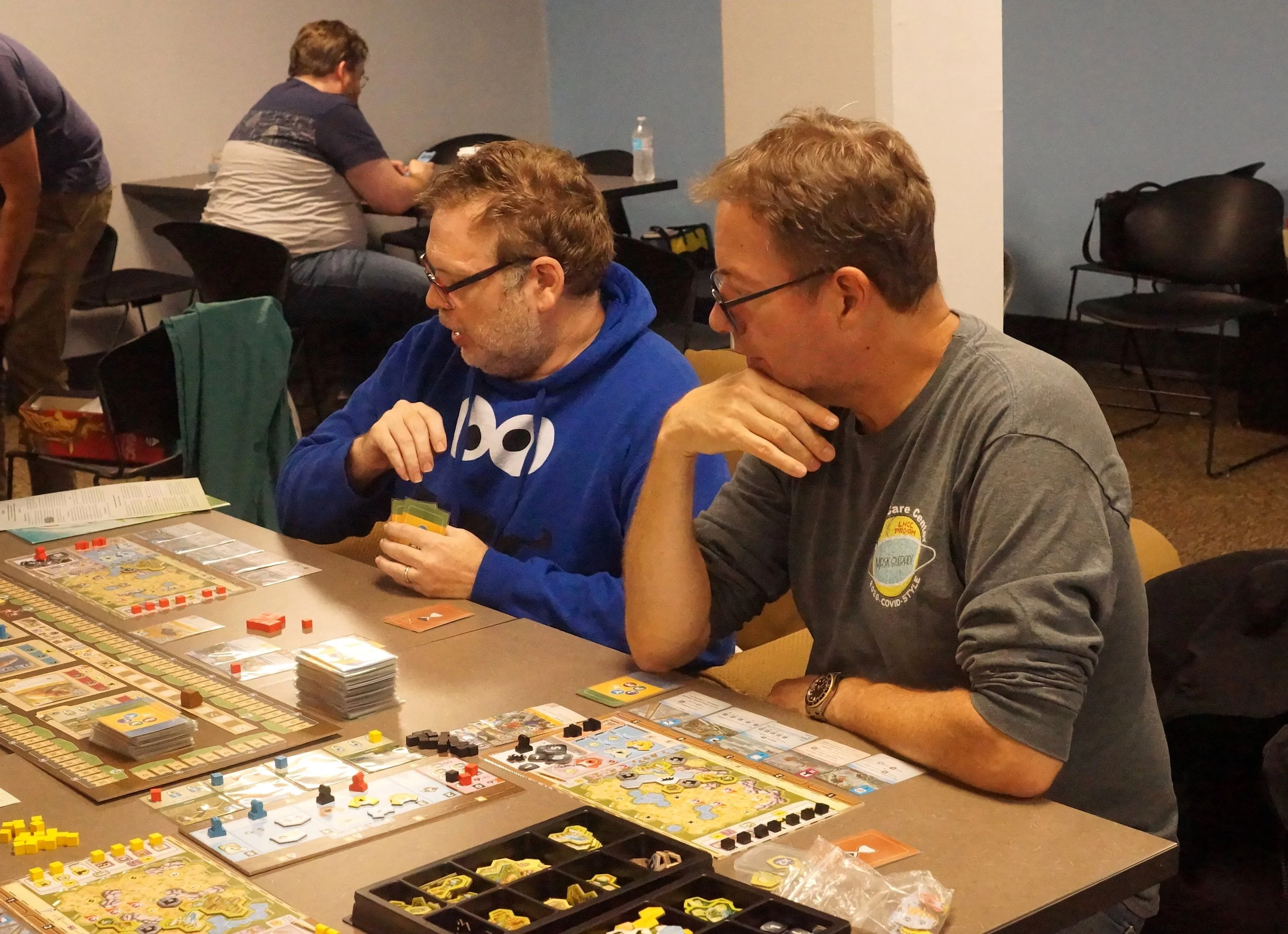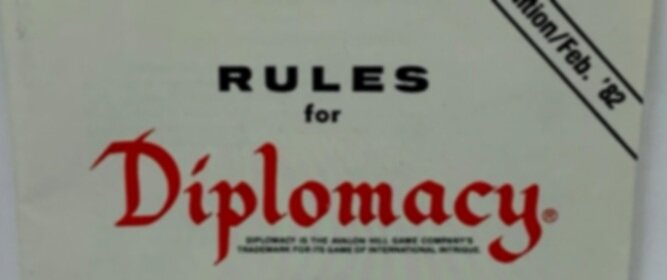
Tournament Descriptions and Rules
Diplomacy events vary widely in format and structure. Strong Diplomacy players know how to adapt to their surroundings, and succeed regardless of venue.
DIXIECON SCORING SYSTEM (for Diplomacy and Team Dip events)
Win: 270 points
2nd: 70
3rd: 50
4th: 34
5th: 20
6th: 10
7th: 0
Also, each player receives 4 points per center held at the end of the game.
Places are determined by the number of supply centers at the end of the game. Ties split the points for the tied places involved. Eliminations are scored by order of elimination, with the first eliminated being 7th place.
Participants in a draw split the total points for the places involved in that size of a draw. For example, a 2-way draw is worth 170 points each, plus the supply center points. Other common draw values are 130 for a 3-way and 106 for a 4-way.
Note that a 2-way draw is worth 10 "centers" more than a 3-way, and a 3-way is worth 6 "centers" more than a 4-way. Take that into account as you determine your position on draw votes during the game.
Draws are voted by secret ballot. You need David Hood or his representative to conduct any such votes. Draws need NOT include all survivors, but the vote for draws or concessions must be unanimous. No draw or concession can be proposed until after the Fall 1905 adjudication. A game cannot be conceded to a player who does not have at least 12 centers AND has centers greater than or equal to the number of any other current power on the board.
There are no overall time limits on the Friday and Saturday rounds. There is a limit of 15 minutes per negotiation phase, 5 minutes per order -writing phase unless different limits are imposed by unanimous vote during the game. The Sunday round ends at a time between 7 and 9 hours after the game begins. During the Sunday round, draw/concession votes will be conducted quickly while the time continues to run in any given phase. Should the GM believe that proposals are being made solely for delay purposes such proposals may be summarily dismissed. A player can publicly veto any proposal, in order to speed up play.
A player’s score is best two out of the three rounds.
LET'S TALK SCORING SYSTEMS - DIXIECON IS UNIQUE
Well actually, Dixiecon used to be just one of many tournaments in North America that used what is called "draw-based" scoring. Why do we still do this, when other tournaments have either moved to "topping the board" type systems, or the European systems that end games after particular game years? At Dixiecon we have always believed that Diplomacy is about control of the stalemate line, not possession of a certain number of centers at an arbitrary time. A Diplomacy board is under control when a player or group of players have the ability to force through the stalemate line from one direction or the other - or at least can convince the other players such a situation exists. So, for those not used to a draw-based system, the point is to establish such dominance of board position that the members of the draw have controlled the board. Of course, all the other surviving players must also vote to end a game in any particular draw. The game only ends with a win, a concession, a draw, or a demonstrated stalemate where no centers change hands for 4 game turns. We at Dixiecon believe that a skilled Diplomat can succeed under varying scoring systems - and that each system should be seen as emphasizing and rewarding different skills, similar to how golf events can be scored under match play, stroke play, skins, etc. and how tennis is played on different surfaces.
IRON MAN COMPETITION
Many other games are played at Dixiecon throughout the weekend. In the early years, separate tournaments in such games at 1830 and Titan were mainstays of the event. Now that the gaming world has so heavily diversified in game choices, the non-Dip gaming at Dixiecon is judged by wins in multiples games of multiple types. Games are divided by type into Schedule A, B, C, D, or E games, with wins in the longer, more difficult games counting for more than those of the lighter, frothier variety. Michael Lowrey is the GM for this event. Throughout the weekend, you'll get points for the number of players you finish ahead of, extra points for winning the game, and your score is then modified based on the length and complexity of the game as reflected in its Schedule A, B, C, D or E status.
Here are a few games of each type so you can get the idea:
A: 6 Nimmts!, Can’t Sop, Coloretto, Mint Works, Sushi Go
B: 7 Wonders, Azul, Carcassonne, Lost Cities, Splendor, Stone Age, Takenoko, Ticket to Ride
C: Alhambra, Castles of Burgundy, Catan, Innovation, Quacks of Quedlinburg, Race/Galaxy, Roll/Galaxy, St. Petersburg, Small World, Targi, Vinci, Wingspan
D: Agricola, Altiplano, Concordia, Nations, Navegador, Orléans, Power Grid, Puerto Rico, Terraforming Mars, Titan, Twilight Struggle
E: 18xx, Age of Renaissance, Here I Stand, Terra Mystica, Through the Ages
Battlestar Galactica: Human or Cylon?
They've Got a Ticket to Ride
Steve Koehler and Ed Rothenheber tangle over a Nations game
2021 Iron Man Champ Rick Desper Ponders
Hugo Max Fairbanks Sports Yankees Jersey
Ronke, Hood and Morgan Show Seersucker
Bruce Duewer and Eric Erikson compete in Ark Nova
Dixiecon 2025 Narrative Report
Dixiecon 2025 Narrative Report
By Tournament Director David Hood
Last year, it was the improbable Sunday round solo that put Karthik Konath over the top, edging out perennial contender David Miller for the Dixiecon 38 win. This year, a different situation - David Miller and Randy Lawrence-Hurt were both riding Austrian solos from the Saturday round into the action on Sunday. And both were playing Turkey on their respective boards. Another thrilling conclusion was in the offing, but which would come out on top!
Before we get there to that dramatic Sunday, let’s set the stage by reporting on all Dixiecon 39 goings-on prior to Round Three. For many Dixieconers, including me, the fun started on Thursday afternoon as early arrivals began to trickle down to the Granville South basement to start the open gaming for an event in Chapel Hill that has been running continuously since 1987. We had quite a crowd actually for Thursday gaming this year, including some of the many first time attendees. Just some of the games I saw hit the tables included Dune Imperium, One Hour WWII, Settlers of Catan, Terraforming Mars, Point Salad, Istanbul, Spendor and, for the first of many times that weekend, Age of Renaissance made a climactic comeback after being a fan favorite of yesteryear.
Lest you Dip-only fans think there was nothing happening for you, au contraire - Keith Worstell’s 2-player Dip variant based on the American Civil War also got a playing, as it has before.
Even more folk arrived as the day progressed that Friday. While some went in pairs and groups to Franklin Street for food and other frivolity, gaming also continued in the basement of Granville as usual. I saw Downfall of Empires, 1830, Brew Crafters, Titan, and Space Base played early in the day, with Here I Stand, Railways of the World, and Darwin’s Journey taking over as the afternoon dripped close to the 6pm start for Round One of the Diplomacy tournament.
Which came soon enough. It has become a tradition for those who can to wear something made out of seersucker for the Friday night round, so there was a smashing smattering of southern style. Once the round got going, we had six boards of Diplomacy players battle for position while the Iron Man gamers tried out more Istanbul and Age of Renaissance as well as new titles such as Ark Nova, Barrage, Mahjong and Cascadia, as well as that perennial Dixiecon favorite, Outpost.
Some of those first round Dip games ended early, such as the 3 way David Miller achieved in 1905 with Keith Worstell and Tim Richardson in the Nina Simone game (1A), a result important to Miller’s later standings. Other games took significantly longer, with the Ben Folds game (1C) coming to mind, as Dave Smith, Justin Loar and Karthik Konath finally achieving a 3 way after 3am once Tim Crosby voted his Germany out of the draw once it became clear the others would grind him out if he didn’t. Importantly, Randy Lawrence Hurt played England in that game and was eliminated first, in 1905, achieving zero points and thus becoming his drop game for the tournament by necessity.
Round Two on Saturday morning is where the wheat and chaff are often separated at Dixiecon, as its unlimited duration makes it easier to achieve larger scoring results than the Sunday round (although this effect is overemphasized, as I will discuss later.) Again we had six boards, and again two games in particular stand out - the two Austrian solos I mentioned earlier, with Randy Lawrence Hurt taking his by concession at 16 in Game 2F (John Coltrane) and David Miller with 19 centers in Game 2E (Avett Brothers). Because at Dixie each center is worth 4 points, this twelve point differential would loom large. By the way, it should be noted that Austria had a great Rd 2 as well, with Justin Loar in 2A (K-Ci) and Kirk Vaughn in 2B (Clay Aiken) also participating in three way draws.
Have you noticed this year’s game naming theme yet? Yes, all musical artists from North Carolina.
Iron Man gaming certainly did not slow down during the Saturday round, as we had 18 non-Dip gamers in boards of Air Baron, Unmatched, St Petersburg, Terraforming Mars, Source of the Nile (blast from the past again), Furnace, Ark Nova and Here I Stand. These numbers were augmented as the afternoon wore out and those out of their Dip games slipped seamlessly into games of something else. When 3pm rolled around though, I knew it was time for me to slip out and get the BBQ stuff organized. This went off without a hitch starting at 5pm (no rain this year thank goodness) after which a couple of the Dip games resumed play while others settled down for… more Iron Man gaming. Games I saw played for the first time on Saturday night included Tzolkin, Codenames, Thurn and Taxis, Power Grid, 18 India and Can’t Stop (nope, they couldn’t) along with additional boards of Terraforming and Dune Imperium.
Another thing that has become traditional at Dixie on Saturday night is a group playing Magic, including a few gamers who came to the Con just for that. Awesome time seemed to be had by all.
So, Sunday morning would decide the championship. Would David Miller cash in his already-achieved 3way and solo for his third Dixiecon title, or could Randy L-H replace his crappy Rd 1 score with a better result in Rd 3 than Miller had gotten in Rd 1 to eek out a tournament victory of his own? Or would some other player achieve the Sunday Solo and challenge them both for First Place?
This is where I should point out that, yes, the Sunday round had a time limit. It starts at 8:30am or thereabouts and finishes sometime between 3:30 and 5:30 pm. Starting in 1904, the negotiation time is also lowered to 12 minutes per turn, to allow for maximum time per game. I don’t like time limited games very much, and try to allow the players enough leeway to accomplish something on their boards while still getting us done at a reasonable hour on Sunday. This year, as is often the case, all the game (six this year) were done WELL BEFORE 3:30. In other words, none was ever close to being called for time. My own personal view is that folk should have played longer on some of these boards, as the endtime was way, way later than folk thought.
At any rate, what happened? Both Randy and David ended up as Turkey on their boards. Both had monster games, with Randy in a 3way with 17 and David in a 3way at 15. Nailbiter, but David was able to edge Randy by one center to take the championship home with him to Maryland. Another important games in Rd 3 featured Ed Sullivan’s 3 way in Russia at 11 in the Thelonious Monk game to nab him a Third Place plaque with Keith Worstell with 11 as England also putting him into a tie for Fourth with Sophie Lewis. Other top seven finishers were Dave Smith at 6th and Justin Loar at 7th, both playing in their first Dixiecons.
Games eligible for scoring in the Iron Man tournament, for non-Dip gaming, were allowed up to 2pm on Sunday. New titles played that morning included First Rat and Castles of Burgundy, to go along with more Terraforming, more Spendor, and more Railroads of NA. After all the games were complete, Tedd Mullally walked away with this year;s Iron Man trophy, with Michael Lowrey and Graham Woodring taking 2nd and 3rd. Other awards this year included Barbara Zhang as Player’s Choice, Team Tournament winners Brian Ecton, Doc Binder, and Randy Lawerence Hurt, Will Andrews for I Got Hammered, Justin Loar as the Golden Blade, and Todd Craig for the Brick. Best Countries were awarded to Miller and Lawrence-Hurt for Austria, Keith Worsell (E), Karthik Konath (F), Jack Craig (G), Tim Crosby (I), Sophie Lewis as Russia and Randy as Turkey.
As aside - the North Carolina based club Cardiac had to be pleased with their showing here as their players took 2nd, tied for 4th, and won best countries for Austria, England, Germany, Russia and Turkey. And Todd got the Brick. Impressive.
After the awards ceremony, some went to eat and then come back to play games. Some just went to play more games without eating. Either way, with no competition at all involved, the gaming was still hot and heavy, including Terraforming, Ark Nova, Titan, Railroads, but strangely, no Escape from Colditz this year. What we did have, for the first time, was a DBN watch party upstairs in the lounge area. This was an absolute blast and is something we will definitely schedule from now on at Dixiecon.
What a great way to end a great gathering of great people playing great games as part of a, yes, great hobby. For all those who cannot go to Greece next year for World Dipcon, please come to our tournament instead as we will be celebrating the 40th straight year of Dixie-fun here at the same Dixie-time, same Dixie-channel.

